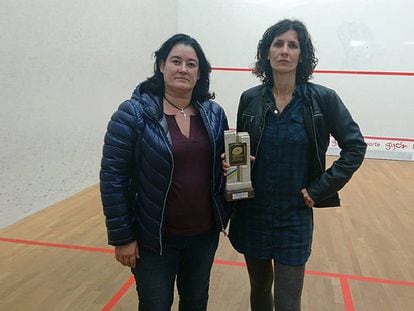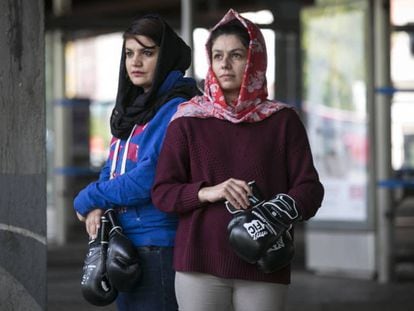Dead for $1,430: the fate of Mexican boxer Jeanette Zacarías
A young female pugilist’s terrible death has sparked doubts about whether she was fit to fight in Canada
/cloudfront-eu-central-1.images.arcpublishing.com/prisa/LKK45XI6TRDRHKYK363W4WSNKM.jpg)
Irene Zapata Silva was in the kitchen of her home on Thursday afternoon in San Francisco de los Romo, in Mexico’s Aguascalientes state, when she heard a scream from the living room. It would foretell the worst possible news: her husband had received a call informing him that their 18-year-old daughter Jeanette, who had been in a coma for several days, had died. “It’s been very hard,” said Zapata Silva in a telephone interview. “At first I couldn’t even react.”
Since then, Zacarías’ death has provoked an avalanche of doubts and accusations. It has also revealed the sordid underbelly of boxing, a sport that is highly popular and closely followed in Mexico, and the lack of preparation that many young fighters have for potentially lethal bouts.
The teenager died at around 4 p.m. on September 2 at Montreal’s Sacré-Coeur hospital. She had been in intensive care since Saturday night after losing her fight by technical knockout to the Canadian boxer Marie-Pier Houle at the end of the fourth round. Seconds after the referee stopped the fight, Zacarias suffered convulsions and was transferred to the hospital, where she spent five days in an induced coma.
Zacarías had arrived in Canada following her dream of becoming a great boxer, and was set to receive 1,800 Canadian dollars (about 1,430 US dollars) for the Saturday night fight, according to Canadian media. The Montreal bout was also her first outside Mexico. Previously she had clocked up two wins and three losses (two by knockout). Her most recent bout took place on May 15 after more than two years without competing, and she lost by technical knockout to the Mexican-American Cynthia Lozano.
Zacarías stepped into the ring in Canada a little more than three months after that brutal loss, and a video of the previous bout shows how she received several blows to the head while standing defenseless against the ropes. Canada’s RDS channel has also released information regarding how Zacarías was hired. An organizer working with Yvon Michel, the promoter of the event, was tasked with finding fighters, and knocked on doors in other Canadian provinces, as well as in the United States and Europe. But Covid-19 restrictions and busy schedules meant he turned up nothing until an agent based in Mexico put forward the names of Jeanette Zacarías and Jovanni Martínez, her partner and trainer.
Doubts about the organization of the bout between Jeanette and her Canadian opponent quickly arose within the boxer’s family. “I didn’t agree with her decision to fight,” explained Zapata Silva. “I think her opponent didn’t make the required weight. She looked older. I asked my daughter who had certified that [Houle] had made the weight, but she said everything was fine. I told her that if at any point she felt she couldn’t do it, she should drop out or stop the fight. I know she gave it her all,” said her mother.
For working-class Mexicans, boxing can be a springboard to fame and money that offsets the violence. Young boxers undergo grueling training and hope to be discovered by bout organizers, who are willing to pay low wages in exchange for juicy profits in an industry worth hundreds of millions of dollars a year. Many of them look up to figures like the retired boxer Floyd Mayweather, who has amassed millions of dollars over the course of his career. Many, like Jeanette, do not receive adequate training and instruction on how the bouts will unfold when they face their opponents.

Zapata Silva insisted her daughter was well prepared and excited about the trip to Canada. “She left happy,” she said. Despite her enthusiasm, Jeanette’s mother still worried about her and didn’t want her to continue boxing, especially after the fight against Lozano, when she was knocked out and lost consciousness for three hours. “I told her to quit boxing, but she wanted to continue. It was her decision and as parents we must respect her decision and give her our blessing,” said Zapata Silva.
Yvon Michel, the match promoter, announced the news of her death on Thursday night via social media. Zacarías was accompanied by Martínez, who also participated in the event held on August 28 at the IGA stadium in Montreal. Jeanette’s opponent, Marie-Pier Houle, said she was “devastated” by the news. “I offer my deepest condolences to her family and her partner Jovanni Martinez. Please respect my wish not to comment further,” she wrote on Facebook. She shut down her account a few hours later.
Quebec’s alcohol, lottery and gambling commission, which also regulates contact sports, stressed on Saturday that the Mexican boxer had passed all the required medical tests leading up to the bout. Geneviève Guilbeault, Quebec’s Minister of Public Safety, announced on Friday that an investigation would be opened into “the probable causes and circumstances that led to the athlete’s death.” The commission has said it will cooperate with investigations into the tragedy, and pledged to “minimize the risks associated with the practice of high-risk sport.” Michel said Friday on Twitter that he is also willing to collaborate with the authorities’ inquiries. His office did not respond to interview requests from this newspaper.
Jeanette started boxing as a child. At the age of 12 her father enrolled her in boxing classes in the hope that she would learn self-defense in a country where 10 women are murdered every day. “She saw that she had talent and she kept going,” her mother recalled. “At first I was scared for her, but I could tell she had a gift for boxing and that’s why I supported her,” she added. “Then the Reynosa incident [the Lozano bout] happened and I didn’t like it anymore, and asked her to stop,” she said.
Mexico’s boxing authorities have not commented on the case or the circumstances surrounding the fight. Mauricio Sulaimán, the controversial president of the World Boxing Council (WBC), told the newspaper El Universal on Friday that boxers needed an additional period to retrain following mandatory time out from competing due to a serious knockout. “She was suspended for 90 days, but she passed that and was able to fight a few days later,” he said. “I feel that the interpretation of a suspension, especially following important knockouts, should be taken into consideration so that they don’t train, they don’t spar and after that there is an additional period before they can fight again.”
In San Francisco de los Romo, Zapata Silva confirmed that the state authorities in Aguascalientes have been in contact. Her husband spoke with the state governor, Martín Orozco, who said that the repatriation of their daughter’s body could take 10 to 15 days. Alejandro Estivill, Mexico’s consul-general in Montreal, said his staff had been in constant communication with her partner and entourage, and the event’s organizers. “When her condition became more critical, we received a request from her family, in particular from her father, to process a special permit for him to travel to Montreal, exempting him from the limitations that currently exist for travel because of Covid-19,” said Estivill. The permit was granted, but it was too late. “Unfortunately, Jeanette passed away and the father made the decision that he preferred to wait for his daughter’s body in Mexico,” said Estivill. “The promoter has committed to covering the costs of the repatriation,” he added.
Meanwhile, neighbors have lined up at the door of the Zacarías Zapata Silva home, offering financial support, prayers, and the organization of a tribute to the young boxer killed in combat. It’s a story that once again opens the debate over the violence and exploitation that surround boxing. “I don’t blame anyone,” said Jeanette’s mother. “I know she gave it her all, but I would have preferred her not to become famous this way.”












































